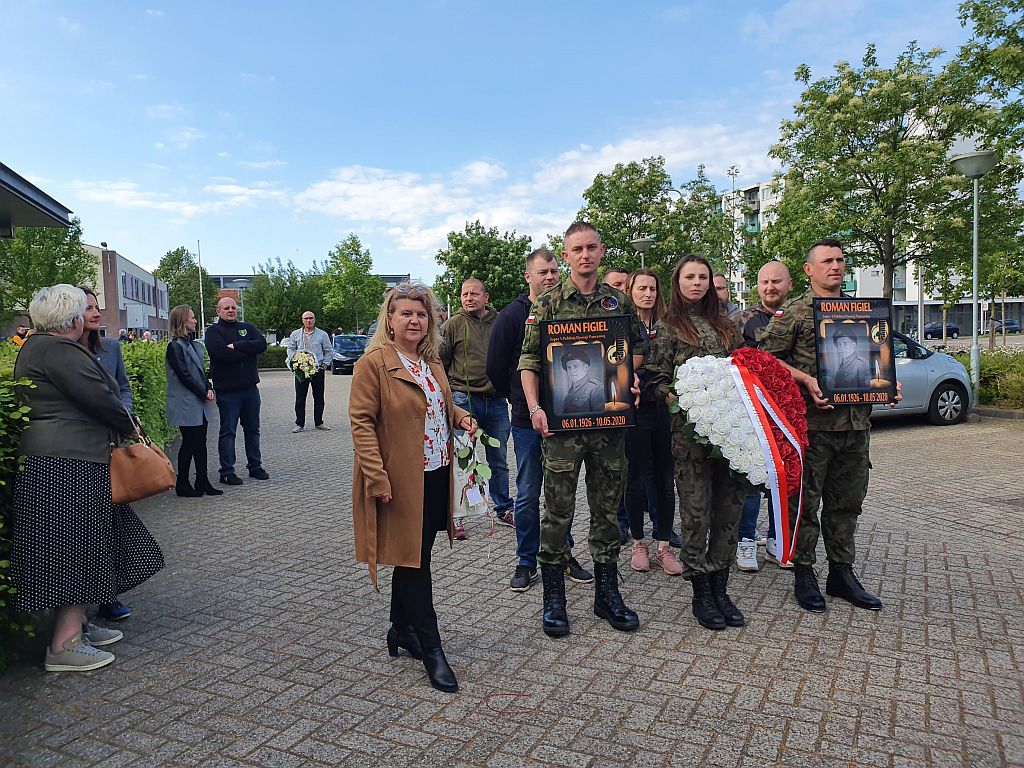After the end of World War II many Polish soldiers from the Polish Armed Forces in the West did not re turn to their homeland. They were afraid of repressions of the communist regime or wished to arrange a new life in exile.
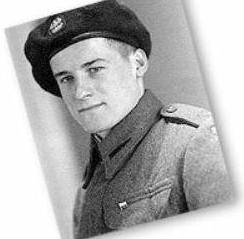 This was the reason for the young sapper Roman Figiel, who as a soldier of the famous 1st Armored Division of General Stanisław Maczek took part in the liberation of Breda and Arnhem in September 1944. The young soldier passed the entire combat route of the 1st Armored Division and returned to Breda, where earlier met his love of life, the young Dutch girl Joke.
This was the reason for the young sapper Roman Figiel, who as a soldier of the famous 1st Armored Division of General Stanisław Maczek took part in the liberation of Breda and Arnhem in September 1944. The young soldier passed the entire combat route of the 1st Armored Division and returned to Breda, where earlier met his love of life, the young Dutch girl Joke.
In January 2018 Roman Figiel turned age of 92 years [he died on May 10th, 2020 – Hbt]. He lives with his wife in a modest house in Breda. Having good care of his closest family and friends, he enjoys health extraordinary for this age. What’s more, with a positive attitude to life, he willingly takes part in social life, and even more willingly accepts guests at home. He likes to tell his story, recalling the past years with a tear in his eye. The memory of the past is supported by numerous publications, books, articles in newspapers and photos collected over the years, and meticulously supplemented by his son Ad. One can find them all over the house. On the wall in the living room there are photos of important ceremonies and, of course, the picture of Mr. Figiel.

Without war his life would probably have been completely different, but would the hero of this story want to turn time back?
But let’s start from the beginning.
The war
Roman Figiel was born on January 6th, 1926 in Upper Silesia, in the village of Janów near Katowice (since 1951 a part of the city), in a large miner’s family (there were 6 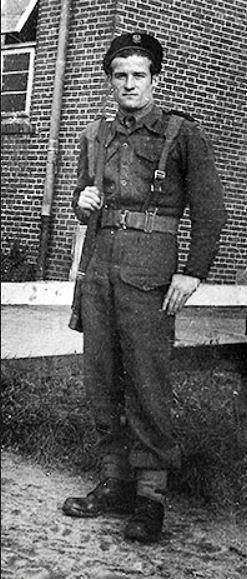 brothers and 2 sisters). After the outbreak of the war his father and two brothers were sent to work in Germany. The oldest one was shot for escaping and beating up the Germans when he had learned about his wife adultery with Germans. Young Roman had to maintain the rest of the family by himself, and then, at the instigation of his older brother, he managed to run to the West of Europe to join him. The brother went to the Canadian army (after the war he settled in Canada) while Figiel was captured by Germans and forced to work hard, including construction of the German defense line in Normandy. From there he managed to escape in June 1944 and reach the Americans who had just landed in Normandy. The Americans sent him to Scotland, where the 1st Armored Division was formed under the command of General Stanisław Maczek. Figiel went to the battalion of sappers and learned how to build bridges and disarm mines. After three weeks of training under the watchful eye of General Stanisław Maczek, he became a soldier and received Polish uniform, which was a great event for him.
brothers and 2 sisters). After the outbreak of the war his father and two brothers were sent to work in Germany. The oldest one was shot for escaping and beating up the Germans when he had learned about his wife adultery with Germans. Young Roman had to maintain the rest of the family by himself, and then, at the instigation of his older brother, he managed to run to the West of Europe to join him. The brother went to the Canadian army (after the war he settled in Canada) while Figiel was captured by Germans and forced to work hard, including construction of the German defense line in Normandy. From there he managed to escape in June 1944 and reach the Americans who had just landed in Normandy. The Americans sent him to Scotland, where the 1st Armored Division was formed under the command of General Stanisław Maczek. Figiel went to the battalion of sappers and learned how to build bridges and disarm mines. After three weeks of training under the watchful eye of General Stanisław Maczek, he became a soldier and received Polish uniform, which was a great event for him.
After training he was transported by boat to France. The first soldier’s encounter with war occurred at a time when several practiced sappers were killed during an attempt to disarm the new German mines, and fragments of the masking net fell on Figiel and his colleagues having rest at this moment. It was also a great horror to watch the allied (!) bombers approaching and the view of the opening holds of bombs… Maczek’s soldiers were bombarded by the Allies by mistake. To avoid this in the future, they got yellow scarves, which they would wave at the sight of English planes flying over them. It was just such a scarf that young Joke remembered later so well.
As a sapper Roman Figiel only occasionally participated in battles, because his task was to build and rebuild bridges and mine clearance. This was his main occupation in Breda, liberated by Polish soldiers on October 29th, 1944. In this city Poles stayed for five months.
The love
In Breda, an 18 year-old soldier met Joke Vetter, one year younger, who later became his wife. After arriving at Breda Figiel was sent to her family home in district Ginneken. The perspective of sleeping in bed pleased him much, because so far he slept only on the blanket under his jeep! At Vetters’ Roman found not only a comfortable accommodation, but also a big love. When he arrived in his jeep to their house, he saw a girl in the window and waved a yellow scarf towards her. She turned her back, just like she was not interested in him. In fact, she fell in love with a Polish soldier at first sight. After years Mrs. Joke remembers this moment well: – He came to my parents’ house with a jeep and waved to me with a yellow scarf. I fell in love with him at first sight, but being embarrassed, I left the window right away.
After a few days Figiel asked the young Dutch girl to go to dance with him and that’s how their story began. Roman lived with Vetters for a while and thanks to his hard work he gained trust of Joke’s parents and friends. When he had to leave the city and move to Germany, he promised the Dutch maiden that he would come back to her, and he kept his word. Upon his return Roman and Joke decided to marry, but because of the different religions – he was a Catholic, she was a Protestant – Dutch pastor did not accept this marriage and refused to celebrate the ceremony. At that time the so-called religious pillars (zuilen) very effectively separated both religious environments in the Netherlands. Fortunately, Roman’s colleagues found a way to overcome this obstacle, advising: “Tell the priest that you HAVE TO.” Young and innocent Figiel did not know what it meant, but the priest immediately set the time of the ceremony in three weeks. The marriage of Joke and Roman was concluded on December 7th, 1946 – the groom appeared in a military uniform, the bride in a silk dress bought specially for the occasion in Antwerp (she was lucky to get white while many women had to use black one for wedding).
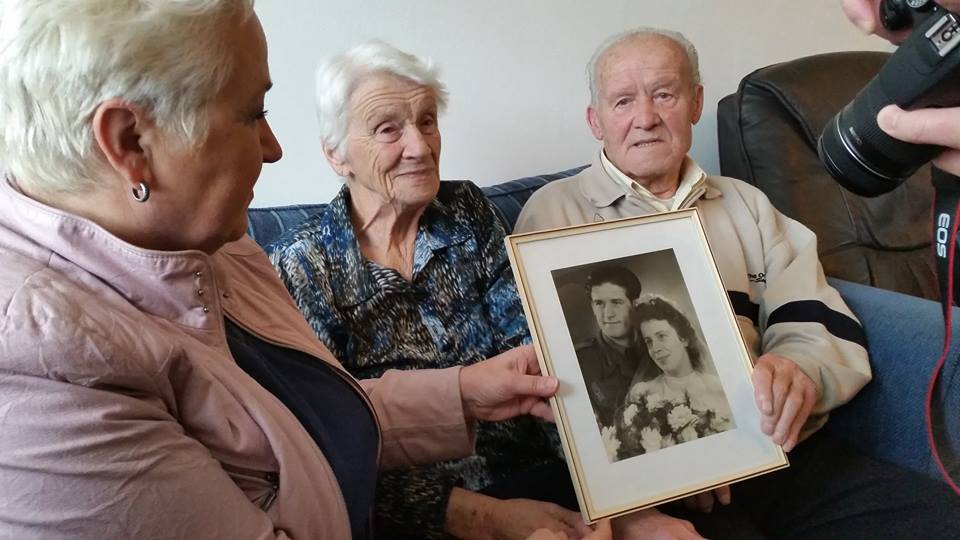
– And how you talked to each other? – I asked Joke during one of my visits. – We hardly talked at all – she answered with a laugh. – Roman did not speak the language well and has not learned it well so far. Despite this, we get along. We do not need much to be happy.
The Netherlands
However, the young couple did not found their existence easy. Immediately after the war there was no work in Breda and the young husband could only patch holes on the roads, using his own shovel in work. He grabbed every job. He pushed the snow away, worked hard in a metal factory. Later, he managed to get a better job at the Ericsson Telecommunications Company in Rijen – to get there he had to bike 12 km one way. To earn more, he worked on the chord (more he produced, more was paid). There was no time to learn any profession. He had to feed not only his own family in the Netherlands – he had son Ad and after seven years Hans – but despite his poor earnings he used to send 20-30 kg packages of clothes and food to his family in Poland every month.
After 30 years of work at Ericsson Roman Figiel retired. He is currently living with his wife in a small house with a garden, full of beutiful plants carefully hand-cherished by himself. He proudly shows it to his guests, just like his medals, books and photos. She regrets that most of the family and friends are gone forever, but every meeting, especially with children and the local Polonia [the name of Poles living abroad], made him very happy.
Privately, Mrs. And Mr. Figiel are very humble people. In December 2016 they celebrated their Platinum Mariage. On this occasion the Polish-Dutch couple was visited by the mayor of Breda, Mr. Paul Depla, who brought them a huge bouquet of flowers and a congratulatory letter from His Royal Majesty the King of the Kingdom of the Netherlands, Willem Alexander and Her Royal Majesty the Queen Maxima.
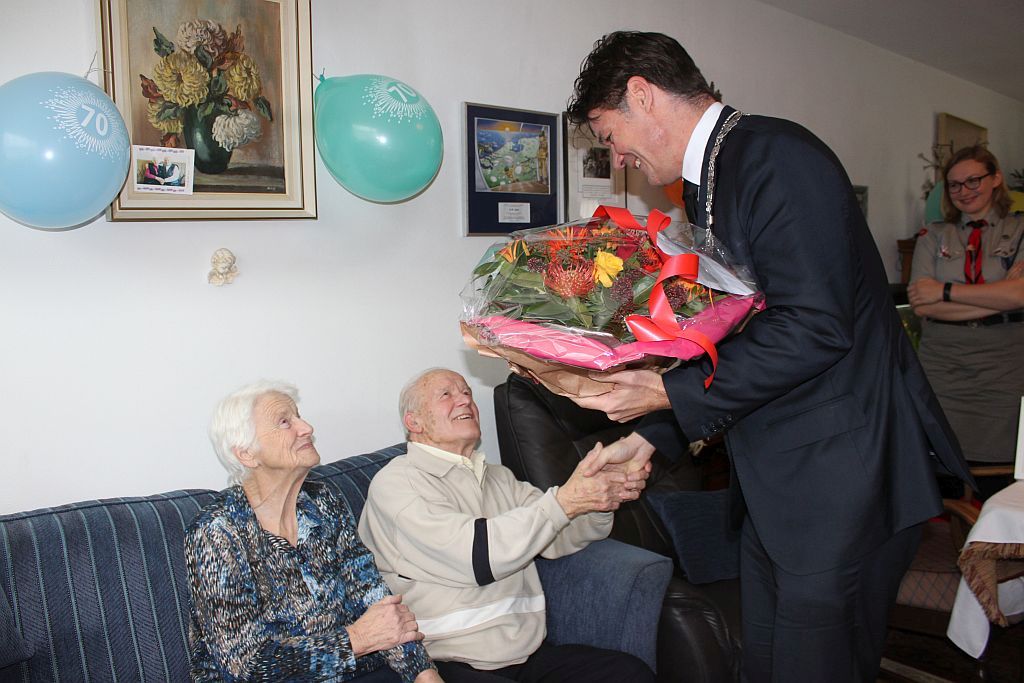
After 70 years of the marriage Roman and Joke still look at each other with love, caring eyes and a smile on their faces. When I leave them, they hold hands and wave to say goodbye, asking when I will visit them again.
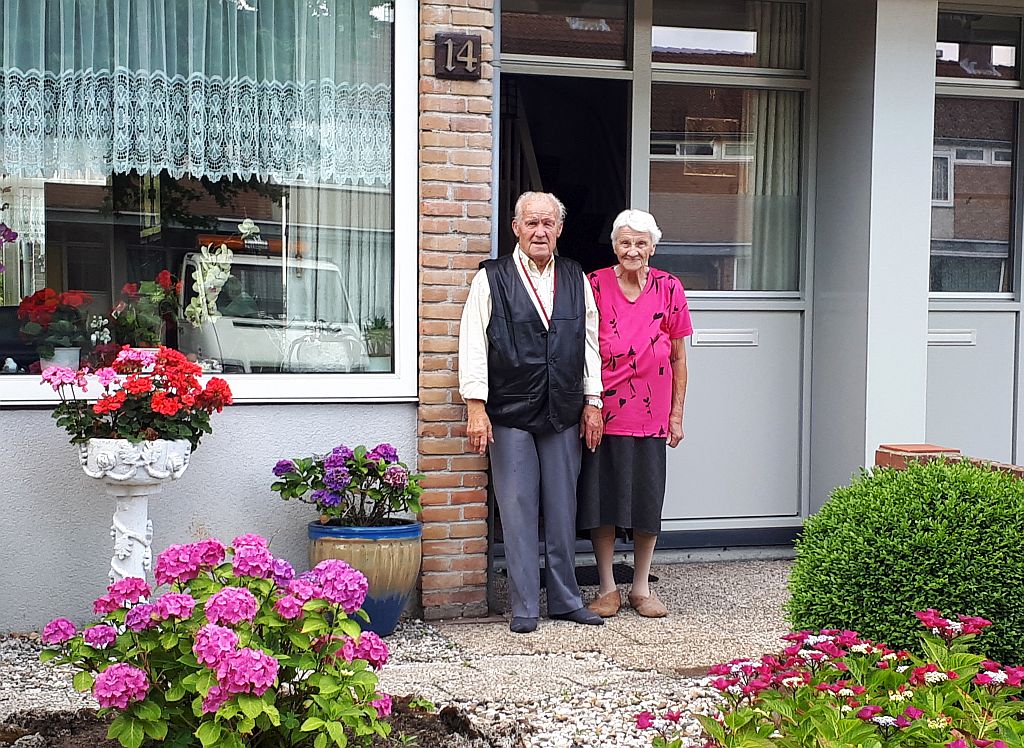
At present Mr. Figiel is one of the very few still alive Polish war veterans living in Breda, while there were about three hundreds of them after the war. Of twelve soldiers trained on the sappers, only three survived and came to Breda, including young Figiel, who during the entire war was not even scratched with a bullet or a bomb. – I had more luck than brains. They used us, I was stupid – he recalls. For many years the Polish sapper, like other Polish liberators of the Netherlands, felt underestimated by the Dutch authorities. He had to cope with difficulties of life with no help, but he did not complain. The change happened only during the celebration of the 50th anniversary of the liberation of Breda, when for the first time the last few Polish veterans felt really honored. Roman Figiel has six medals (Polish, British, French, Canadian), but he particularly values the medal on the occasion of the 60th anniversary of the liberation of Breda. He also has a good memory of the Liberation Day (Bevrijdingsdag) of May 5th, 2012, when Prince Willem Alexander and Prime Minister Mark Rutte appeared in Breda and he and his grandson stood close to them.
The uniform
In June 2017 I visited Roman Figiel with members of the Kawasaki motorcycle rally following the footsteps of Gen. Maczek, in a company of Han Tiggelaar from the portals “Holandia bez tajemnic” (Holland without secrets) and “Polen voor Nederlanders” (Poland for the Dutch). Roman showed the guests souvenirs from the war, photos, publications, but he could not, unfortunately, present his uniform, which was given by him, immediately after the war, to a collector of military goods. After all, the war was not supposed to happen anymore! Interestingly, a few months later he was again called to military service to disarm sea mines. He managed to avoid service because of being married.
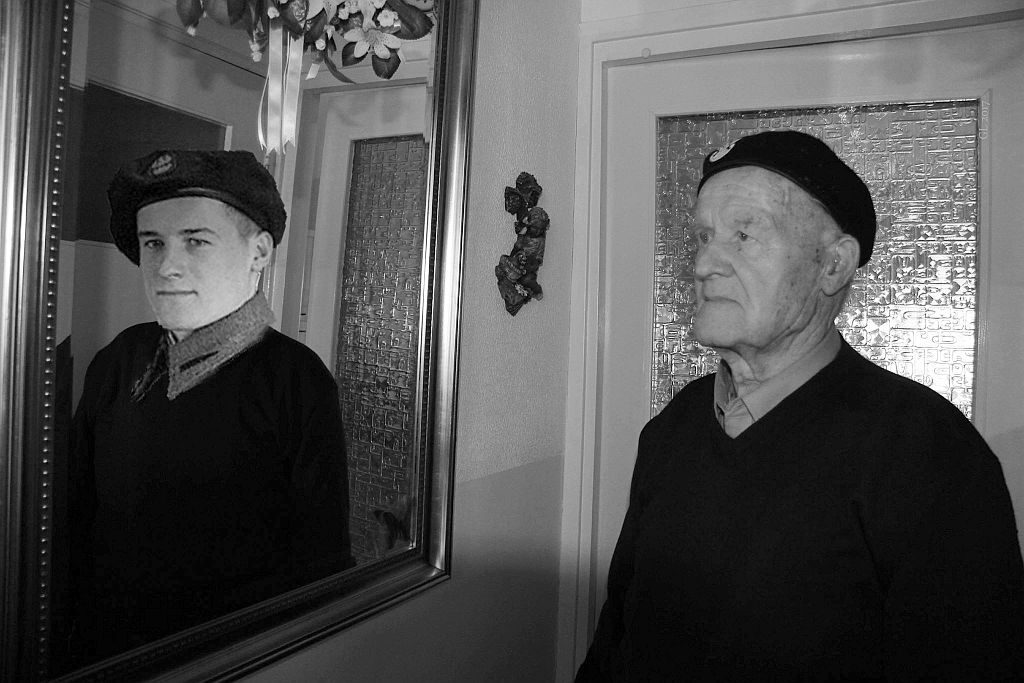
The uniform, unfortunately, is missing. A special sign of the uniform was the sappers’ identification mark – a yellow-black cord worn on the left shoulder. It is very important for Roman to regain it.
Poland
Roman Figiel has not considered returning to Poland at all. It was already known that reprisals would be waiting there, even deportation to Siberia, and his family fell apart as a result of the war. When asked if he missed Poland and relatives, he replied: “I knew that I had nothing there to return to. I had a family, I had to keep her. It was not easy. I had to work”. He visited his homeland for the first time after the war in the 1970s to meet mother, who was helped by him regularly with food parcels. Today there is no one relative left in Poland, the only brother alive lives in Canada, so his real home is the Netherlands.
For a long time Roman was not attracted to the country of his origin, but unexpectedly the day after his 92. birthday his son Ad called to me with information that he and his father plan to go to Poland, to visit Krakow and Janów to see whether the family home is still standing. Fortunately, Mr. Figiel is in a good physical condition. – We will go only for a few days – said Ad. – We cannot leave my mother alone for too long!
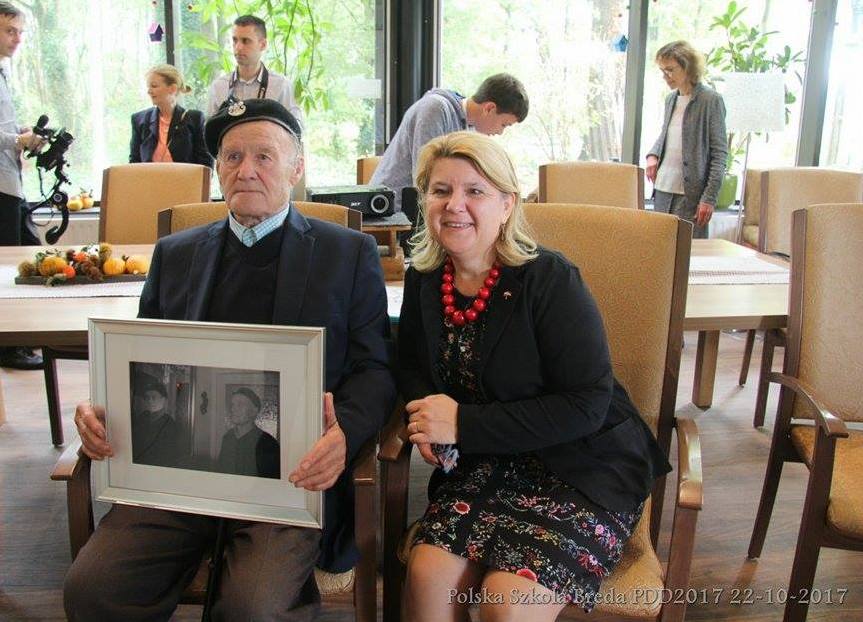
In the picture: Roman Figiel with author, Małgorzata Lubbers-Dąbrowska
Małgorzata Lubbers-Dąbrowska
Publication: March 23,.2018
The author of this article is Mrs Małgorzata Lubbers-Dąbrowska, a Polish activist from Roosendaal and the chairwoman of the Polish School in Breda, who is a friend of one of the last Polish veterans in Breda, Mr. Roman Figiel. We thank Mrs. Małgorzata very much for writing this story especially for us.
Pictures: Małgorzata Lubbers-Dąbrowska, archiwum p. Figiel, Polska Szkoła w Bredzie
The Last Farewell May 14th, 2020

